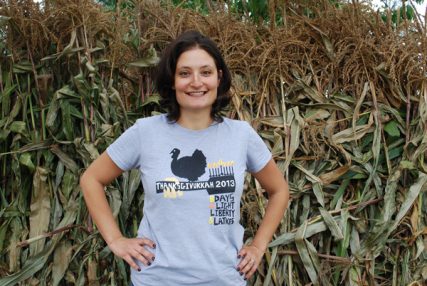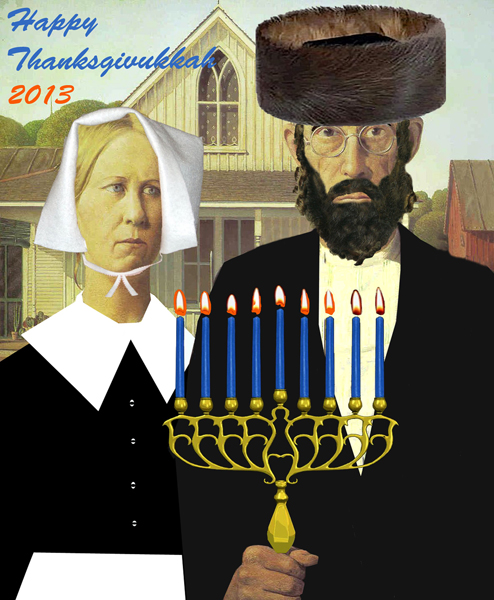(RNS) It last happened in 1888 and, according to one calculation, won’t happen again for another 77,798 years: the convergence of Thanksgiving and Hanukkah.
This year, Nov. 28 is Thanksgiving and the first full day of the eight-day Jewish festival of lights, which begins at sundown the previous night.
For many Jewish Americans, this is no trivial convergence, but a once-in-an-eternity opportunity to simultaneously celebrate two favorite holidays, one quintessentially American, the other quintessentially Jewish.
Earlier this year, when the rarity of the synergy began to dawn on American Jews, they began concocting “Thanksgivukkah” mash-ups.
— 9-year-old Asher Weintraub of Brooklyn, N.Y., invented a “menurky,” a turkey-shaped menorah — or Hanukkah candelabra – and has sold more than 1,500 of them.
— Jewish cooks have created recipes for everything from pumpkin latkes (Hanukkah’s signature potato pancake) to turkey brined in Manischewitz (the syrupy kosher wine Jewish Americans love to make fun of but drink anyway.)
— Rabbi David Paskin of Norwood, Mass., co-wrote “The Ballad of Thanksgivukkah,” which manages to rhyme “latkes” with “religious minorities.”
“It’s fun, and let me go on record on saying that ‘fun’ is a good thing,” Rabbi Rick Jacobs, head of the congregational arm of Reform Judaism in North America, said of the hybrid holiday.
Jacobs isn’t the only Jewish American to note that Hanukkah and Thanksgiving align not just in time, but thematically. They both celebrate religious liberty: The Pilgrims sought religious freedom in the New World, and the ancient Jews’ triumphed over Greek oppressors who had banned the practice of Judaism.
“To me, that is such a beautiful and powerful linkage of the two holidays and I hope we get to celebrate that as well as cranberries on our latkes,” Jacobs said.
Or, as Rabbi Tzvi Freeman recently wrote on the website Chabad.org:
Thanksgiving is “a narrative about an arduous journey to escape religious persecution for freedom in a new land, the establishment of a democratic charter and the sense of Divine providence that carried those refugees through their plight.”
“That’s Chanukah, as well,” Freeman continued. “A narrative deeply embedded in the collective Jewish psyche of how we fought back against religious oppression in our own land, earned our freedom and thanked G‑d for the miracles.”
The miracle of Hanukkah is set in the 2nd century B.C., when a small band of Jews, the Maccabees, triumphed over the forces of King Antiochus IV.
As the Maccabees rededicated the desecrated Temple in Jerusalem, a small quantity of oil, enough to last for only one day, miraculously burned for eight, which is why Jews light the candles on the menorah for eight nights.
The quirk of Thanksgivukkah is that the Hebrew calendar, which follows the sun and the moon, and the Gregorian calendar, where Thanksgiving sits on the fourth Thursday of November, has aligned this year so that the two holidays are on the same day for the first time since 1888, 25 years after President Abraham Lincoln declared Thanksgiving a holiday.
As for the long stretch before this will happen again, credit for the calculation goes to Jewish American physicist Jonathan Mizrahi, who explained in a blogpost in January that the Jewish and Gregorian calendars are drifting apart in such a way as to separate Thanksgiving and Hanukkah for more than 70 millennia. (Others who have also done the math note that the first night of Hanukkah — remember, the holiday begins at sundown — will converge with Thanksgiving as early as 2070.)
For many Jews, Thanksgiving and Hanukkah are a much better fit than the holiday Hanukkah often coincides with: Christmas. The somewhat tongue-in-cheek term “Chrismukkah,” a celebration that invokes both traditions, can be fun for college roommates of different faiths or Jewish-Christian families.
But for Jews who feel that the Christmas season overwhelms Hanukkah, or even that the relatively minor holiday of Hanukkah gets over-hyped to compete with Christmas, the idea of a Christmas-Hanukkah hybrid doesn’t always sit well.
But Thanksgivukkah? It’s not going to outlive Chrismukkah, but while it’s here, Jewish Americans are going to make the most of it.
The term was actually trademarked, by Dana Gitell of Boston, who thought it up last year as she drove to her marketing job at an elderly care agency, and began brainstorming ways Thanksgiving and Hanukkah could dovetail.

Dana Gitell in Thanksgivukkah shirt available at ModernTribe.com. Photo courtesy of Melinda Casey-Magleby.
“There are so many interesting and playful cultural juxtapositions that come to mind,” she said. With her sister-in-law, Deborah Gitell of Los Angeles, she created a Thanksgivukkah Facebook page, printed T-shirts and enlisted artist Kim DeMarco to draw a “Happy Thanksgivukkah” poster, a spoof on “American Gothic” that features a Hasidic man as the farmer who holds a menorah instead of a pitchfork.
In keeping with Thanksgiving’s emphasis on thankfulness, and the Jewish requirement to give “tzedakeh,” Hebrew for charity, 10 percent of the profits from the Thanksgivukkah wares will go to MAZON, a Jewish anti-hunger group.
The sisters-in-law are also throwing a giant Thanksgivukkah party in Los Angeles on Nov. 29.
But not everyone loves Thanksgivukkah, according to Comedy Central’s Stephen Colbert, the self-described the “pope of basic cable.”
“How dare you, Hanukkah!” he mock-protested.
“Pretty soon school kids will think Thanksgiving started when the Wampanoags sat down with the Maccabees and the yams lasted for eight nights.”
KRE/AMB END MARKOE
Video courtesy The Jewish Daily Forward








